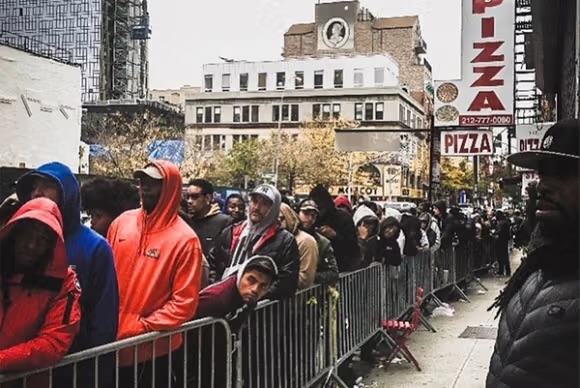Over the past two decades, sneakers have transformed from athletic gear into a cultural currency. What served as performance footwear for athletes is now a multibillion-dollar industry blending art, fashion, and status. But as sneakers have exploded into the mainstream, with celebrity collaborations, limited drops, and resell markets reaching absurd valuations, something vital has been lost. Authenticity, knowledge, and appreciation for sneaker culture has been diluted with only a few key figures taking the time to genuinely learn and educate. It’s time to make an unpopular argument: sneakers need more gatekeepers.
The Original Culture Was Built on Community, Not Clout
Before the internet, getting a pair of Jordans or Dunks meant effort. You had to know which stores got shipments, camp out overnight, build relationships with shop owners, and actually wear your shoes. The early sneaker scene was about passion and community, people connected by shared taste and would say it how it is. Today, much of that spirit has been replaced by hype. Cultural hubs have lost their allure as the genuine collector gets pushed out by the more aggressive resellers. The vindictive comment section has allowed people who turned up 5 mins ago to have the same platform as those who built their way up through years of work. Algorithms dictate taste, and sneakers as stocks. The language of the culture, stories about design, heritage, and craft, has been overshadowed by unboxing videos and “hold or sell?” TikToks. Gatekeeping, in the best sense of the word, used to protect the culture from exactly this kind of hollow commercialisation.

Gatekeepers Preserve Standards and Stories
Every subculture has curators, Sneakerdenn, Jasmine “KixieJixie” Gonzalez, Ernie “erniepunk” Beckmann and “Kish Kash” are notable as they uphold history and its values through their own perspectives. In sneakers, those were the collectors, shop owners, and designers who educated newcomers, called out fakes, and contextualised why a pair mattered through a wider perspective and deeper references. They weren’t elitists; they were archivists. Gatekeeping, at its healthiest, isn’t about exclusion. It’s about stewardship. It’s ensuring people understand why a shoe like the Air Max 1 “Atmos Elephant” or the Jordan 4 “Black Cement” holds significance. It’s about teaching that sneaker culture was born from basketball, hip-hop, skateboarding, and streetwear and will die if things don’t change. Without people safeguarding that context, sneakers are becoming just another disposable fashion trend.
The Resell Economy and Cultural Erosion
The modern sneaker market rewards scarcity over story but scarcity means nothing if its just a price tag. Limited-edition drops sell out in seconds because demand outweighs supply,only to reappear minutes later at triple the price. While this cycle drives profit for the manufacturers, its driven away genuine enthusiasts and those who lived the “IRL” sneaker experience. Gatekeepers must push back against that. They remind brands and consumers that hype doesn’t equal heritage. They create spaces, online or in-store, where authenticity and appreciation matter and they can tell the story. They demand that sneaker companies respect their roots rather than exploit nostalgia.
Reclaiming the Culture
More gatekeeping doesn’t mean locking newcomers out but it does mean excluding some of the more egregious nonsense we have let slide. It means setting expectations for queuing, encouraging people to learn, engage, and respect what came before them. Setting up spaces to discuss and learn. As patta would say “Each one, Teach one” It’s the same way hip-hop, skate, and graffiti cultures maintain it’s integrity: you have to earn your place, not just buy it. When everyone has access there is no culture and its time sneakerheads grew a backbone. Sneakers don’t need to be elitist, they just need caretakers who love them for what they mean, not just what they’re worth. We already know those who cause trouble, those who have perverted the industry and profited off others’ passion.
The Bottom Line
Sneaker culture became a global phenomenon because it had roots: creativity, rebellion, identity, and community. Those roots are worth protecting. The answer isn’t to make sneakers inaccessible it’s to make the culture intelligent again and that starts with some hard truths that access isn’t the answer and some people have burned their bridges. We don’t need to pander to the lowest common denominator. We are better than that.